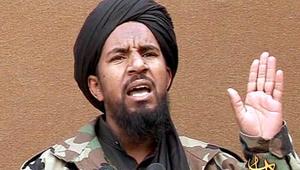TerrorismU.S. drones take out al Qaeda’s second in command
In another impressive coup for the U.S. campaign against al Qaeda, missiles launched from a CIA drone Monday morning killed Abu Yahya al-Libi, al Qaeda’s second in command; the killing of al-Libbi closes a circle: following bin Laden’s death, five high-level al Qaeda operatives were considered as potential successors; since last August, the United States has taken out four of them — Ilyas Kashmiri, Abdul Rahman Atiya, Anwar al Awlaki; and now al-Libi; the killing of al-Libi is but the latest manifestation of how the Obama administration has intensified and expanded the campaign against al Qaeda and its affiliates

Abu Yahya al-Libi, al Qaeda's former second in command // Source: elmundo.com.sv
In another impressive coup for the U.S. campaign against al Qaeda, missiles launched from a CIA drone Monday morning killed Abu Yahya al-Libi, al Qaeda’s second in command.
Al Libi, who was in his late 30s when he died, was born in Libya and made a name for himself as a young student when he joined Islamic anti-Qaddafi forces which tried to turn Libya into an Islamic republic. He was chased out of the country in the early 1990s and went to Afghanistan to join the Mujahdin as they emerged from the war against the Soviet occupation of the country.
His religious schooling persuaded Osama bin Laden to appoint al-Libi to head al Qaeda’s religious committee, a body in charge of indoctrinating new recruits and offering Koranic justifications for al Qaeda’s campaign of terror.
He was captured by U.S. forces in Afghanistan in 2004, but on 10 July 2005, together with several other prisoners, escaped from Bagram prison and fle3d to Pakistan. After his escape, he was filmed in dozens of al Qaeda propaganda videos.
He kept rising within al Qaeda ranks. Jarret Brachman, a counterterrorism expert who has studied al-Libi for the past seven years, explained that he was influential and popular within al Qaeda because of his “scholarly credentials, street cred from having escaped from Bagram, charisma and his easygoing, tribal speaking style.” Brachman added: “People may have revered Zawahri, but they loved Abu Yahya.”
he reference to Bagram refers
There was another reason for al-Libi’s growing influence: relentless U.S. attacks on al Qaeda hideouts in Pakistan have not only killed many militants and their commanders, but made it exceedingly difficult for al Qaeda leaders there to do much more then concentrate on their sheer survival.
This has caused al Qaeda affiliate groups in Yemen, Somalia, and countries in North and West Africa — countries where al Qaeda operatives are not yet subject to the same level of intense lethal attention to which their brethrens in Pakistan are subjected — to rise in relative importance within the global al Qaeda network. Al Libi, hailing from Libya, was closer to leaders of these groups then others in al Qaeda top echelon.
After the killing of bin Laden last spring, al libi became al Qaeda’s general manager. He helped run the day-to-day operations of the organization, and was Ayman al Zawahiri’s gate keepr: people who wanted to talk with al Zawahiri had to go through al Libby first.
Analysis
Thinning al Qaeda’s leadership ranks. The killing of al-Libbi closes a circle. Following bin Laden’s death, five high-level al Qaeda operatives were considered as potential successors. Since last August, the United States has taken out four of them. Ilyas Kashmiri, al Qaeda’s director of external operations, was killed on 3 June 3. Abdul Rahman Atiya, bin Laden’s chief of staff, was killed 22 August 2011. Both of those attacks took place in northwestern Pakistan. Anwar al Awlaki, a leader of al Qaeda in the Arabian Peninsula and an American citizen, was killed in Yemen on 30 September 2011.
Intelligence. The deadly pin-point drone strikes against leaders and commanders of al Qaeda in Pakistan and Yemen should tell us that al Qaeda’s own security has been severely compromised, perhaps irreparably. The degree of U.S. intelligence’s penetration of al Qaeda is high, and the quality of U.S. human and SIGINT information must be high to achieve this level of operational accuracy.
Focus. This is not the place to debate the merits of the 2003 invasion of Iraq, and reasonable men and women have their differences on the issue. One thing, though, is not in debate: the invasion and subsequent occupation of Iraq were a distraction from the war on terror, necessitating the diversion of substantial intelligence and operational resources from the Afghanistan-Pakistan theater, and making it difficult to attend to rising terrorism-related dangers in Yemen, Somalia, and west Africa.
The Obama administration, no longer distracted by Iraq, has been able to focus on the war on terror, dedicate more intelligence and operational resources to it, and dramatically intensify and expand the campaign against al Qaeda and its affiliates.
This new focus shows.
